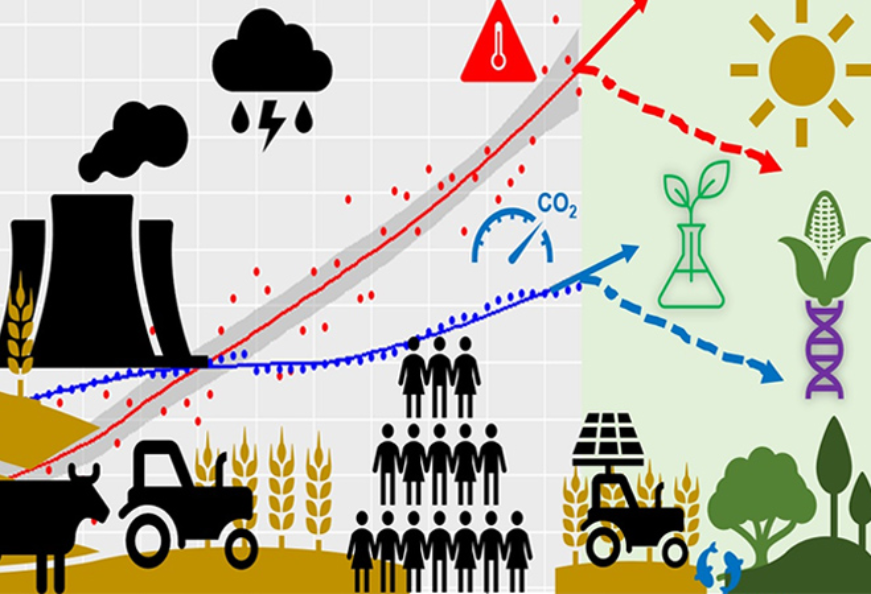-
CENTRES
Progammes & Centres
Location
Your reflection published by Observer Research Foundation brings a complex view between food security, climate change, sustainable agriculture and land use. Is there awareness of this inseparable relationship?

Recent years have seen a surge in recognition of the complex and interdependent relationship between food insecurity, climate variability, sustainable agricultural practices, and land utilisation. This interdependent network has far-reaching consequences for the health of the planet and its citizens. Food security, which is the assurance of regular and equitable access to nutritious food, is facing growing challenges as a result of climate change. Climate variability and unpredictable weather patterns are disrupting traditional agricultural practices, resulting in crop failures and food insecurity. Extreme weather events such as drought and flooding further exacerbate these issues, particularly for vulnerable populations. On the other hand, climate variability is intrinsically linked to agricultural practices and land use. Agricultural practices such as deforestation, livestock husbandry, and the use of synthetic fertilizers contribute to greenhouse gas emissions, which in turn contribute to global warming, and further disrupts weather patterns, thus creating a vicious circle that threatens food production.The solution to this challenge lies in sustainable agriculture, which focuses on practices that maintain or improve agricultural productivity while reducing environmental degradation. Common principles of sustainable agriculture include crop rotation, organic farming and reduced pesticide use. Land use is also a key factor in this equation, as agricultural expansion releases carbon into the atmosphere, which worsens climate change. On the other hand, practices such as reforestation and agroforestry as well as land conservation can sequester carbon and improve soil health, thus contributing to both agricultural and climate change mitigation.The need for a comprehensive approach to address these issues is becoming increasingly apparent. International agreements, like the Paris Agreement and Sustainable Development Goals, emphasize the need to address these issues together in order to create a secure and sustainable future for the planet and its inhabitants.
The topic you have explored has both global and local relevance. How can agriculture be made more sustainable and resilient in communities in developing countries?
Agriculture in developing countries is confronted with a range of issues, such as climate change, resource constraints, and food insecurity. To address these issues, a combination of strategies, tailored to the particular needs and circumstances of each community, can be employed to make agriculture more sustainable and resilient. Examples – increasing crop diversity and diversifying mixed farming systems that include livestock and aquaculture to improve nutrient cycling and resilience; investing in efficient irrigation systems to improve soil health and conservation; promoting organic farming practices; cultivating climate-resistant crops and drought-resistant seeds, such as millets; strengthening market links and value chains to enable farmers to sell their produce at reasonable prices; and providing microfinance opportunities to assist farmers in investing in sustainable practices. Finally, policy support that emphasizes sustainable agriculture and provides incentives for sustainable practices.
The G20 Indian Presidency is an extraordinary opportunity and the topic you have explored is part of the strategic debate. What concrete prospects do you see in global terms?
The G20 Indian Presidency offers a unique opportunity to address global challenges related to sustainable food systems, climate change, and food demand. Concrete prospects include international cooperation, knowledge sharing, policy advocacy, and resource mobilization to create a more sustainable, resilient, and equitable global food system. The G20 can play a pivotal role in shaping the future of agriculture to meet the needs of a growing global population while safeguarding the planet.Agricultural practices and technologies that are resilient to climate change can be adopted around the world. G20 countries can share best practices and technical assistance to assist countries in adapting to changing climate trends and mitigating agriculture-related GHG emissions. G20 countries can promote international cooperation in agriculture research and innovation by pooling their resources and expertise. By working together, countries can speed up the development of sustainably grown crop varieties, pest-resistant crops, and precision farming technologies. G20 nations including India can work together on global food security issues. Coordinating efforts to enhance food distribution systems and reduce food losses and waste, as well as promoting sustainable agriculture, can help to secure more food for vulnerable populations around the world. Agricultural and rural development investments in developing countries, with a focus on infrastructure investment, capacity development, and financial assistance to smallholder farmers in order to alleviate poverty and promote sustainable farming practices, can be leveraged by the G20 as a global governance platform for a sustainable food system. This platform can facilitate dialogue and agreements between nations, establishing shared objectives and benchmarks for sustainable agriculture.
This commentary originally appeared in The Global Eye.
The views expressed above belong to the author(s). ORF research and analyses now available on Telegram! Click here to access our curated content — blogs, longforms and interviews.

Dr. Shoba Suri is a Senior Fellow with ORFs Health Initiative. Shoba is a nutritionist with experience in community and clinical research. She has worked on nutrition, ...
Read More +